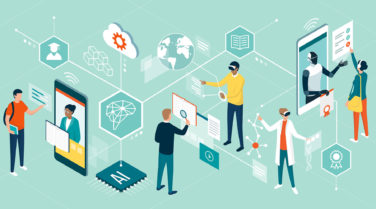Are digital therapeutics “the next big thing”? When MIT Technology Review asks “Can ‘Digital Therapeutics’ Be As Good As Drugs?” and Forbes proclaims “Digital Therapeutics: The Future of Healthcare Will Be App-Based,” signs are pointing to yes.
Think of “digital therapeutics” as the next logical step in the digital health revolution. The emergence of technology to treat and diagnose is happening now. It might look like an app or it might look like a device. It could be technology that monitors your activity ambiently or one into which you actively input information to help your physician better understand your condition.
It might be technology that uses biofeedback to ameliorate your symptoms, or a wearable that detects cancer. Or, it might be a digital pill that can track whether or not you’ve taken your medication (which, by the way, the FDA just approved in November). All of these are examples of digital therapeutics. There’s even a new industry organization, the Digital Therapeutics Alliance. Some examples of how this technology is used:
- VR headsets are being used to ease post-traumatic stress disorder.
- Augmented and alternative communication devices help people with autism spectrum disorders connect with those around them.
- Apps can mitigate the symptoms of ADHD, depression, and anxiety and support people in addiction recovery and weight loss.
- New devices even stimulate memory for Alzheimer’s patients.
Merging Digital with Traditional Treatment
To be clear, digital therapeutics are not a cure-all. But with the right ingredients, their promise is great, especially when combined with proven traditional treatments. Recently, we developed an app to be used by patients with osteoarthritis. The app’s purpose was to integrate data from an activity tracker with education about the benefits of walking on patients’ mobility. It was studied in the MARCHE clinical trial, which investigated its success for patients with knee osteoarthritis who were being treated with an injection. Patients who used the app took an average of 732 more steps per day and reported less pain over those who did not use the app.
Digital therapeutics can offer economic advantages to the healthcare system. They can help a healthcare professional reach a diagnosis, understand a patient’s condition or even alert them to a problem before it happens. They can help a patient stay compliant with their treatment plan, assist in developing healthier behaviors, or work passively to collect vast amounts of data. They offer precision, control, and the promise of greater knowledge. And they’re proving their worth every day in the real world.
Will you soon use an app instead of an antibiotic? Likely not. But for a variety of brands, it might be time to think about how a digital tool might make your medication more effective.










